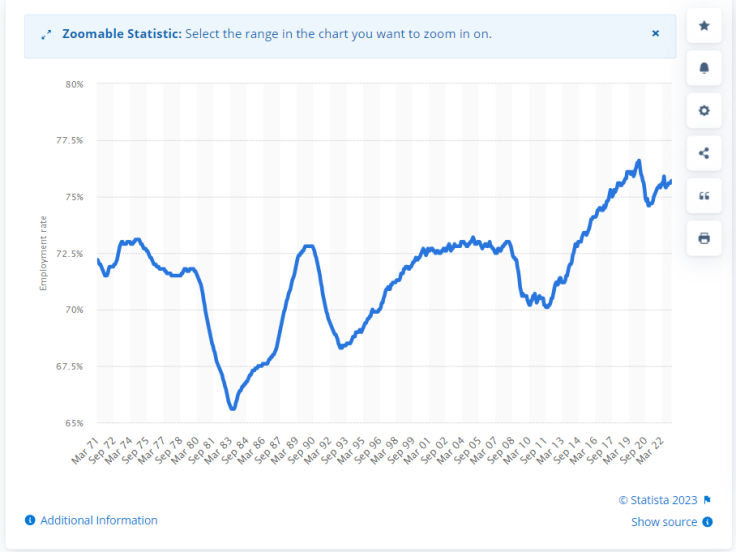Reducing time to hire remains a key trend in HR tech search
Recent data demonstrate that organisations are still trying to reduce the time-to-hire rate and fill key roles in a short period of time amidst a tight talent market and despite a slowing economy.
The latest data from AMS Verified revealed that organisations are trying to reduce the time to hire and fill in key roles in a short period of time amidst a tight talent market and a slowing economy.
According to research conducted by Statista, the employment rate in the UK witnessed a slight increase in January 2023 with a rate of 75.7 per cent compared to 75.4 per cent during the same period in 2022.
Consequently, this is an optimistic view. We've previously reported that job adverts remain high in the UK, therefore making the rate of employment almost simultaneously high with the number of job offers.
However, speaking on the rise of the unemployment rate, Kitty Ussher, Chief Economist at the Institute of Directors, points out that the rise of economic inactivity is "disturbing", based on the data by the Office for National Statistics (ONS).
Ussher commented that the economic stagnation is due to the rise of students looking for employment, as well as the growing number of people being denied the ability to work due to having a long-term illness. These people in ranged from the ages 50s and above, as referenced by Relocate Global.
What we can gather from this is, is that the line of work is draining from the category that has developed the skill and expertise in their work field, due to ageing and illness. Although there is a steady influx of young workers, yet they have not proven their skills in the field.
AMS, the global talent solutions business has unveiled the latest data on search trends seen on its talent technology analysis platform, AMS Verified. Anonymised data from these searches has demonstrated what over 150 talent acquisition professionals have in mind.
Launched just six months ago, AMS Verified's most recent data analysis shows:
- 72 per cent of members searched for technology to reduce the time to hire
- 66 per cent of members selected the objective to increase the quality of hire
- 50 per cent of members selected the objective to increase candidate satisfaction
The given search trends voice in tandem with what the recent data from the ONS has disclosed, that is, more than a million open vacancies remain unfilled in the UK.
Interestingly, in a tight labour market, the competition for skills remains intense as a result of the talent professionals' requirements to get the right skills on board, and in a short period of time.
Reflecting on the data, Jonathan Kestenbaum, Managing Director of Technology Strategy & Partners, AMS said: "HR technology trends are changing quickly." This sounds like the novel methods that the companies are approaching might be more selective of employees on the basis of their skills.
Kestenbaum added: "You only need to look at the recent noise around ChatGPT to see that organisations are open now more than ever, to new and innovative ways of finding the right hires." This, as Kestenbaum reflects, is a strong card for companies for an almost guaranteed business success.

Moreover, the evolving technology that the companies are seeking for hiring or their picky notion of employees goes to the fact that the problem lies in the quality - not the quantity. Reports have previously indicated there would be more talent retention in 2023, due to a shortage of skilled workers.
Intriguingly, an example of this innovation is a customised applicant tracking system, which is one of the trends in HR technology for 2023. Paychex further reported that this technology is designed to prevent qualified candidates from slipping through the cracks.
Moreover, the developing technologies serve both the employer and the employee. The more talent-targeted the companies are becoming should lead workers to invest in mastering a specific skill set to attract these talent-targeted companies.
By and large, the slow pace of the economy did not prevent a high demand for skilled employees. Research reveals that companies seek HR technologies in order to set a skill-centred approach in recruitment.
© Copyright IBTimes 2025. All rights reserved.






















